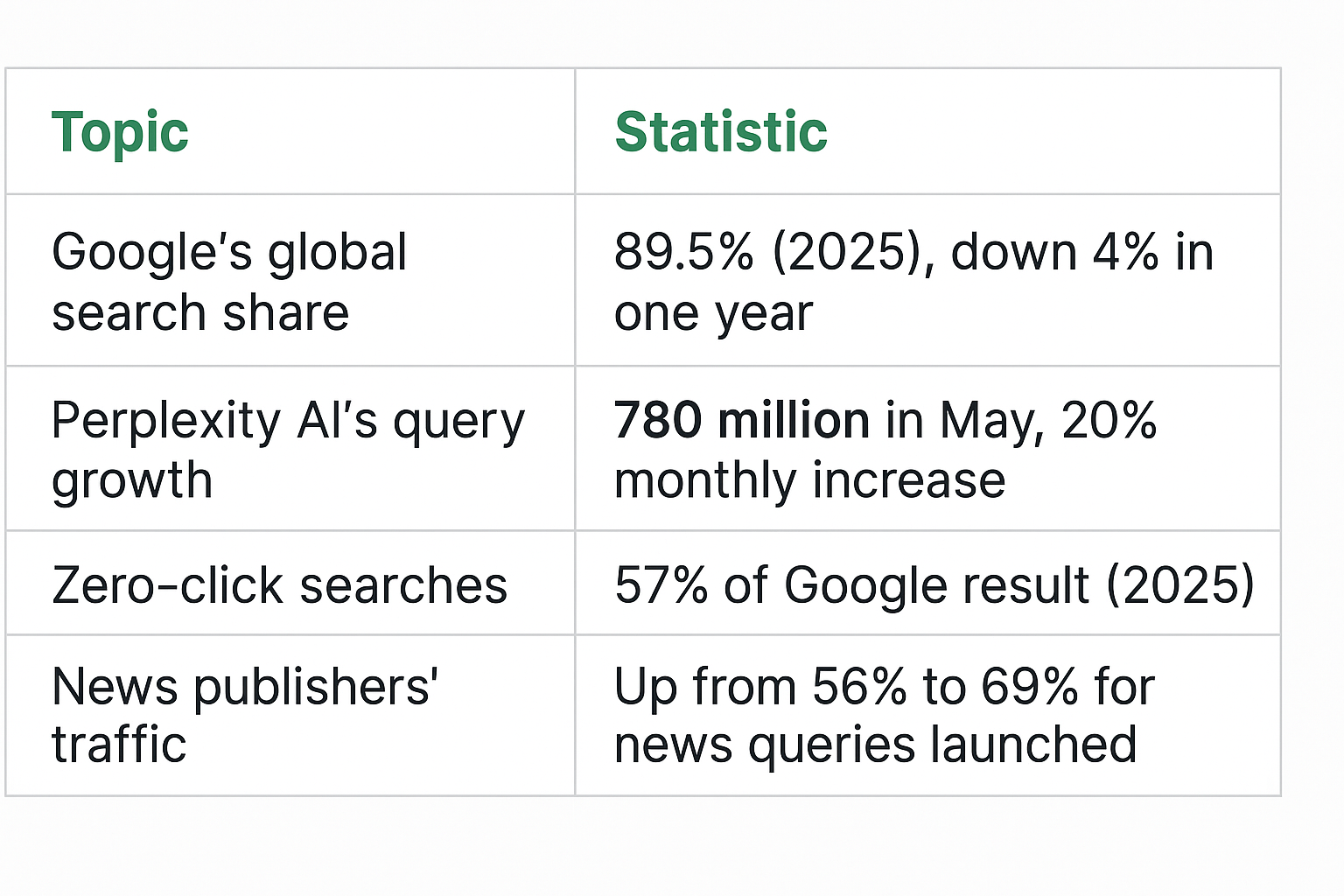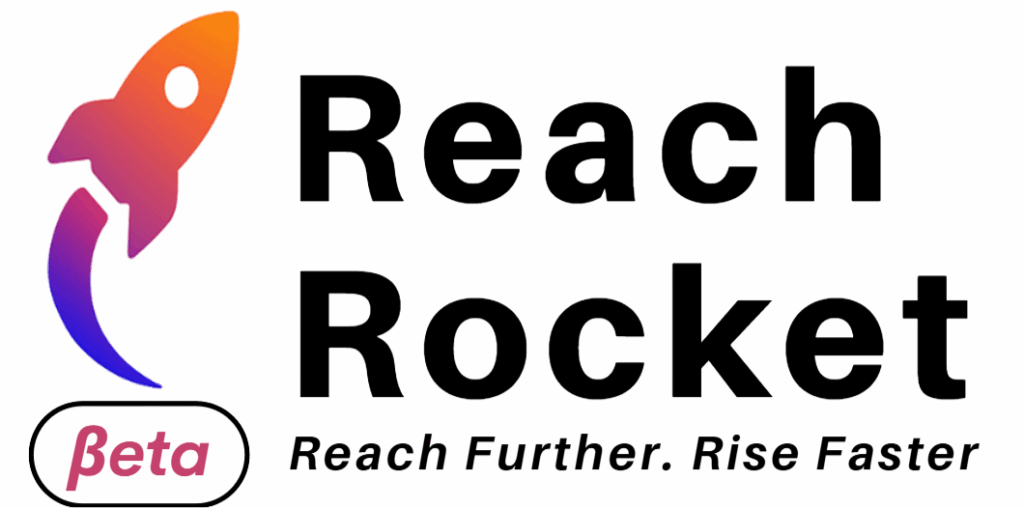AI Search vs. Traditional Search
What You Need to Know and Do in 2025
Overview
Introduction
You now face a fundamentally different search landscape. Google and legacy search engines control less of the market as AI-native platforms like Perplexity and ChatGPT gain traction. If you depend on search for web traffic, you can’t ignore the changes, clicks are down, user behavior is shifting, and only the most adaptive websites will win.
The New Search Market: What the Data Shows
Google’s Share Is Falling
Google still leads, but its dominance is shrinking. In 2025, Google holds 89.54% of the search market—a drop of 4% in just one year. That means millions more people aren’t using classic search.
Microsoft Bing, despite adding AI, slid to 3.95% market share.
Expert Insight:
“AI isn’t just an add-on anymore; it’s disrupting the way users discover answers,” says Rand Fishkin, Search Industry Analyst.
AI Search Growth Is Explosive
Perplexity AI handled 780 million queries in May 2025. That’s 20% more than the month before. CEO, Aravind Srinivas aims for 1 billion queries per week by the end of 2025.
ChatGPT fields about 37.5 million search-like prompts each day and has 800 million weekly users. While its share is small (0.13%), usage is surging.
Gen Z Drives Adoption:
82% of Gen Z users (ages 18-26) have tried AI search. In comparison, only 45% of Baby Boomers have. Still, 71.5% of all consumers have used AI search at least once, and 14% use these tools daily.
Your Website Traffic Is at Stake: CTR and Traffic Trends
CTR Declines Hurt Everyone
When Google shows AI Overviews, you lose clicks. Ahrefs’ study of 300,000 keywords found that top-ranking pages get 34.5% fewer clicks when AI Overviews appear.
Amsive’s survey of 700,000 keywords saw CTRs decline by 15.49% across five sectors. For non-branded terms, it’s even worse—a 19.98% drop. If you don’t rank in the top three spots, you lose up to 27% more clicks.
Zero-click searches (where users don’t visit sites at all) jumped to 69% for news queries in 2025.
Major publishers lost up to 40% of their traffic. Small sites, recipe blogs, and how-to resources nowsee 35–65% less traffic.
Expert Insight:
“AI-generated summaries erode traditional traffic models,” warns Marie Haynes, SEO consultant. “You need to adapt, or you’ll keep losing ground.”
Looking Ahead: Projections Through 2028
AI Search Takes More Ground
Traditional Google search is expected to fall to 75% market share by 2028. AI search platforms could claim over a third of all queries. Google’s AI Overviews will likely appear in 70–80% of results by 2027.
Gartner predicts a 25% drop in traditional search volume by 2026. If Apple ramps up its own AI search, expect these shifts to accelerate.
Platform Moves
Perplexity AI plans to build its own browser and partner with hardware makers.
ChatGPT keeps integrating news feeds and is testing ad models.
Microsoft Bing isn’t growing because users’ habits and its interface still lag behind.
High-Risk Sectors
You’ll feel the impact fastest if you operate in news, recipes, how-tos, or reviews. AI overviews summarize your content, and users don’t need to visit your site.
Publishers and bloggers are seeing ad revenue spiral down.
Medium Risk
E-commerce and local services face moderate risk because AI search struggles with transactions and real-time inventory for now. B2B businesses with complex decision cycles can adapt, but must tune their content to rank in answer engines.
What You Should Do Now (Next 1–3 Months)
1. Add Structured Data: Use FAQ, HowTo, recipe, and other schema so AI can understand and credit your content.
2. Write Conversational Answers: Cover user questions directly, don’t just chase keywords.
3. Tighten Technical SEO: Prioritize speed, mobile, and open your site to AI crawlers, but secure your site.
Next Moves (3–12 Months)
1. Build Authority: Secure media mentions, create original research, and earn backlinks.
2. Grow Direct Traffic: Invest in email lists, social, and brand-building. Don’t rely on search alone.
3. Diversify Content: Add video on YouTube or TikTok, which AI can’t easily summarize.
Long-Term Positioning
1. Boost Brand Power: Become an original, reputable source AI will cite.
2. Track AI Visibility: Use new tools (like SE Ranking’s AI tracker or Peec.ai) to measure mentions and citations in AI summaries.
3. Update Content Strategy: Target questions and user intent, not just broad topics. Monitor how your brand shows up in AI-generated responses.
Website owners lose money as clicks fall. Subscription and direct-user models matter more now.
Big tech companies (Google, Microsoft, OpenAI, Perplexity) now control search channels, so competition gets tougher for independent creators.
Stay alert as AI shifts market power, and push for transparency if your content is used without fair attribution.

You face a new search world. AI search platforms reward authority, clear answers, and strong brands.
If you adapt your content, structure, and distribution, you’ll maintain visibility and revenue. Fail to respond, and your traffic and business will decline.
Act now: prioritize AI-ready SEO, invest in your brand, and build a direct relationship with your audience. That’s how you survive—and thrive—in the AI-first search era.
The age of AI-first search is already here—and those who adapt early will shape how they’re cited, surfaced, and seen.
We’re building Reach Rocket*, a powerful web application for WordPress websites—to help future-proof your brand’s visibility in the AI search era.
Want early access? [Join the waitlist] to be among the first to experience it.
You lose clicks when AI creates summaries that answer users’ queries directly, reducing visits to your
site.
Focus on clear answers, credibility, and structured data markup. Build direct relationships with your
users.
Yes, but its market share is dropping as AI-native platforms grow.
No. News, how-to, and recipe sites lose the most. E-commerce and B2B face moderate change; local
businesses see less impact (for now).
AI-driven search should reach 35% of the market; traditional search will keep declining.
Use new tools to track mentions and citation in AI results, and monitor traffic not just from traditional
search, but from AI-driven sources too.
*GEO Optimizer is now called ReachRocket
kAIron is an Agentic AI platform that helps businesses automate and enhance customer and employee interactions through customizable digital assistants that can be quickly designed, deployed, and optimized in real time.
© 2025 – kAIron – A NimbleWork, Inc. Company





